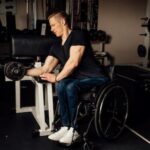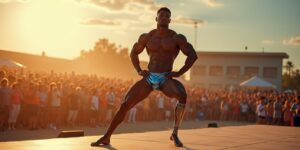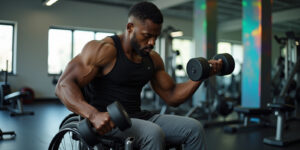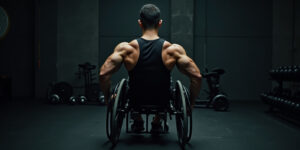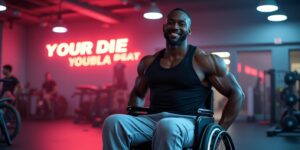Disabled Bodybuilder Success in Bodybuilding is not just about physical strength and endurance. It can also be a powerful tool for improving mental health, especially for disabled athletes. In this blog, we will explore the importance of exercise for disabled athletes and how bodybuilding can benefit them. From increased strength and endurance to improved body confidence and stress relief, we will cover it all.
Disabled bodybuilders are breaking barriers and achieving remarkable success in the world of bodybuilding, showcasing their determination, resilience, and passion for the sport. We will delve into inspiring stories of disabled bodybuilders who have overcome challenges and achieved incredible feats.
We will also discuss the types of exercises that are suitable for disabled athletes, along with things to consider when designing an exercise program. Lastly, we have listed some resources that can help disabled athletes get started with their fitness journey. Join us as we dive into the world of mental health and bodybuilding for disabled athletes!
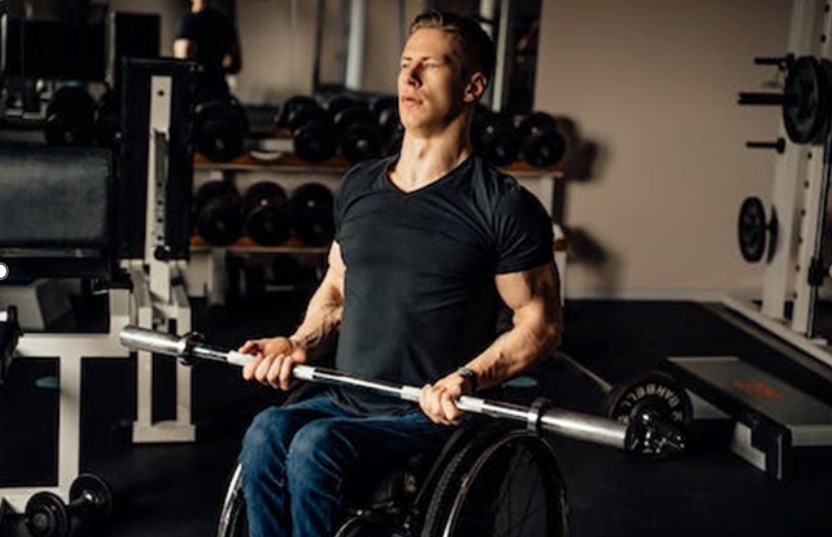
The Importance of Exercise for Disabled Athletes
Exercise is essential for people with disabilities, and it can provide numerous benefits for mental and physical health. Regular exercise can reduce the risk of heart disease, cancer, and other chronic diseases, strengthen bones and muscles, and improve overall health. Disabled athletes can benefit significantly from adaptive sports and exercise programs tailored to their unique physical capabilities.
According to guidelines, adults with disabilities should engage in 150 minutes of moderate-intensity or 75 minutes of vigorous-intensity cardiovascular activity each week. Strength-training activities involving all major muscle groups are also recommended. Coaches must adapt and modify activities to support under-developed elements and unique physical abilities of disabled athletes in well-developed exercise programs.
Exercises that focus on speed, strength, balance, flexibility, and energy production should be individually tailored to the athlete’s ability level. Engaging in regular exercise not only helps improve physical health but also supports mental well-being. It provides an opportunity for disabled athletes to socialize, build confidence and self-esteem while improving their overall quality of life.
- Impact of Exercise on Mental Health for Disabled Athletes
Regular exercise is important for disabled athletes as it can have a positive impact on their mental health and mood. Exercise has been shown to reduce the risk of depression and improve overall mental wellbeing. Adaptive sports and activities can also improve quality of life and social connections for disabled athletes.
To ensure optimal benefits, disabled athletes should aim for at least 150 minutes per week of moderate-intensity cardiovascular activity and two or more sessions of strength training. Regular exercise can also help prevent heart disease, stroke, obesity, diabetes, and cancer.
It’s important to personalize physical activity to the ability of each individual athlete to avoid inactivity. By incorporating regular exercise into their routine, disabled athletes can reap numerous benefits for both their physical and mental health.
- Impact of Exercise on Physical Health for Disabled Athletes
Regular exercise is important for everyone, but especially for disabled athletes. Engaging in regular physical activity can improve overall health and quality of life, as well as reduce the risk of heart disease, obesity, and certain cancers. For disabled athletes, it is recommended to aim for at least 150 minutes of moderate-intensity cardiovascular activity and two strength-training sessions per week.
Engaging in adaptive sports and activities can also improve social life and emotional well-being, while also improving bone density, motor skills, and self-esteem. Despite facing challenges in staying active, people with disabilities can greatly benefit from regular physical activity. Exercise not only improves physical health but also plays a crucial role in overall mental health and well-being.
Benefits of Bodybuilding for Disabled Athletes
Bodybuilding can be a beneficial form of exercise for disabled athletes.
- Regular physical activity provides physical and mental health benefits for anyone, and adaptive sports like bodybuilding can help prevent heart disease, stroke, obesity, and cancer for disabled athletes.
- Bodybuilding also has specific benefits for disabled athletes, including improved bone density, motor skills, emotional health, self-esteem, confidence, and social skills.
- Participating in bodybuilding provides a platform for disabled athletes to acquire life skills that they may not have acquired otherwise.
- Moreover, studies have shown that bodybuilding lowers anger and stress scores among disabled athletes.
Bodybuilding is an excellent way to improve the quality of life of disabled athletes.
Increased Strength and Endurance
Bodybuilding can offer numerous benefits for disabled athletes, including increased strength and endurance. Engaging in mindful exercise can improve overall physical condition and well-being, leading to greater independence and improved quality of life.
When it comes to bodybuilding specifically, focusing on smaller muscle groups can help prevent injury while also improving strength. Regular physical activity through disability sports and an active lifestyle offers benefits for overall fitness as well as cognitive, emotional, and psychological health.
Bodybuilding in particular can increase muscle strength, cardiovascular endurance, and energy levels, all of which are important for disabled athletes looking to maximize their physical capabilities.
Improved Body Confidence
Disabled athletes can benefit greatly from participating in bodybuilding, not only in terms of physical fitness but also emotional and psychological health.
- One of the key benefits of bodybuilding is improved body confidence and self-esteem.
- Regular participation in bodybuilding can result in increased muscle strength, higher energy levels, and better weight control.
- Additionally, bodybuilding can lead to enhanced cardiovascular endurance and better bone density.
- Beyond these physical benefits, engaging in bodybuilding can also have positive effects on mental health.
- It can contribute to reduced stress levels, improved mood, and decreased risk of diseases such as diabetes.
Overall, disabled athletes who incorporate bodybuilding into their exercise routine can experience a range of benefits that positively impact both their physical and mental wellbeing.
Stress Relief
Bodybuilding can have several benefits for disabled athletes, both physically and mentally.
- As an adaptive sport, it can improve overall health, quality of life, and social connections for those living with disabilities.
- One notable benefit is stress relief, which is particularly important for individuals with mental health concerns.
- Despite ongoing illnesses or disabilities, exercise can benefit both physical and mental health for disabled athletes with the help of doctors or physical therapists.
- Regular physical activity, such as bodybuilding, can lead to better fitness, cognitive health, bone density, emotional and psychological wellbeing, and reduced risk for diseases like diabetes.
- Research is being conducted to promote physical and mental health among disabled athletes, including exploring the benefits of immune function and promoting physical activity.
Furthermore, bodybuilding can improve motor skills and self-esteem, making it a valuable activity for disabled athletes to incorporate into their routine.

Cardiovascular Exercises
Disabled athletes can benefit greatly from cardiovascular exercises, which can be achieved through a range of activities and sports.
- For wheelchair users, there are specific workouts and sitting exercises that can provide the necessary cardiovascular exercise.
- Wheelchair sports such as basketball and badminton are also great options for getting the heart rate up.
- It is recommended that disabled athletes aim for at least 150 minutes of moderate-intensity cardiovascular activity per week, along with strength training involving all major muscle groups.
- Engaging in regular physical activity can improve waist circumference, insulin sensitivity, and bladder function in persons with spinal cord injuries.
- For stroke survivors, regular physical activity can help reduce blood pressure and cholesterol concentrations.
Resistance Training
Disabled athletes can benefit greatly from exercise, and there are several types of exercises that can be adapted to meet their physical capabilities. Resistance training is one type of exercise that can be done from a seated position using dumbbells and resistance bands to build strength in the upper body. Exercise programs for disabled athletes should focus on elements such as speed, strength, balance, flexibility, and energy production.
Things to Consider When Designing an Exercise Program for Disabled Athletes
Designing an exercise program for disabled athletes requires careful consideration of their physical and mental capabilities.
- Assessing Physical Limitations
When designing an exercise program for disabled athletes, it’s important to assess their physical limitations and create a customized plan that focuses on improving physical fitness, functional strength, and sport-specific skills. Adults with disabilities should aim for at least 150 minutes of moderate-intensity or 75 minutes of vigorous-intensity cardiovascular activity and two or more sessions of strength training weekly.
- Choosing Exercises based on Disability Type
When designing an exercise program for disabled athletes, it’s important to consider their unique physical capabilities and needs. One key factor is choosing exercises based on the type of disability that the athlete has. For example, people with joint problems may benefit from isometric exercises that help maintain muscle strength without putting undue strain on joints.
- Staying Safe During Exercise
When designing an exercise program for disabled athletes, it’s important to consider several factors to ensure safety and efficacy. One key consideration is staying safe during exercise. It’s important to listen to your body and stop exercising if you experience pain, discomfort, or other symptoms. After exercising, cool down with light activity and stretching, stay hydrated, and wear appropriate clothing.
- Resources for Disabled Athletes to Get Started with Exercise
When it comes to mental health and bodybuilding for disabled athletes, getting started with exercise can be a challenge. It’s important for disabled athletes to aim for at least 150 minutes of moderate-intensity cardiovascular exercise per week and two sessions of strength training. Fortunately, there are several resources available to help disabled athletes get started with exercise. The Ability Gym provides adaptive fitness and rehabilitation programs specifically designed for individuals with disabilities after physical therapy.
Disabled Bodybuilder Success
There are many stories of disabled bodybuilders who have achieved success despite their challenges. Here are a few examples:
- Sham Singh Shera is a wheelchair-bound bodybuilder from India who has won several national and international championships. He was born with polio, but he has never let his disability stop him from pursuing his dreams.
- Caleb Mutombo is a South African bodybuilder who was born with a rare condition that affects his muscles. Despite his disability, he has competed in several bodybuilding competitions and has won several awards.
- Soumen Haldar is an Indian bodybuilder who was born with a congenital defect in his legs. He has overcome his disability to become one of the most successful bodybuilders in India.
These are just a few examples of the many disabled bodybuilders who have achieved success. Their stories are an inspiration to us all, and they show us that anything is possible if we set our minds to it.
Frequently Asked Questions
- What are some mental health benefits of exercise for disabled athletes?
For disabled athletes, exercise can have a range of mental health benefits, including improved mood and self-esteem, reduced anxiety and depression symptoms, and increased social connections through participation in adaptive sports. Exercise can also help build resilience and coping skills for managing the challenges that come with disability.
- Are there any precautions or modifications that should be taken when exercising with a disability?
Yes, there are precautions and modifications that should be taken when exercising with a disability. It is important to consult with a healthcare professional before starting any exercise program and to choose activities that are safe and appropriate for your specific needs.
- What resources are available for disabled athletes looking to incorporate exercise into their mental health routine?
There are several resources available for disabled athletes looking to incorporate exercise into their mental health routine. The Adaptive Sports USA organization offers adaptive sports programs for individuals with physical disabilities, while the National Center on Health, Physical Activity and Disability provides information and resources on physical activity for people with disabilities.
- How can a disabled athlete find the right gym or workout environment to meet their needs?
To find the right gym or workout environment, disabled athletes should look for facilities that offer accessible equipment and accommodations, such as wheelchair ramps and handicap-accessible restrooms. They can also seek out trainers or coaches who have experience working with disabled athletes and can provide customized workout plans.
Let’s Sum Up
Exercise is critical for everyone, and disabled athletes are no exception. It provides benefits to both physical and mental health, including increased strength, improved body confidence, and stress relief. When designing an exercise program for disabled athletes, it’s essential to consider their physical limitations and choose exercises based on their disability type.
There are many resources available for disabled athletes to get started with exercise, such as adaptive sports programs and personal trainers specializing in working with disabilities. So if you’re a disabled athlete looking to reap the benefits of bodybuilding and other types of exercise, don’t hesitate to reach out for support.

